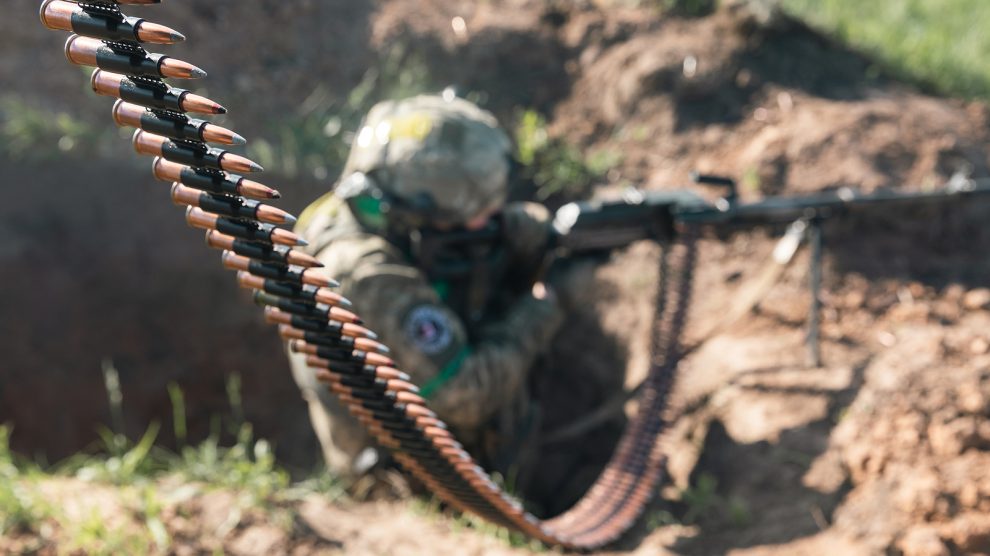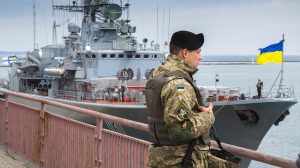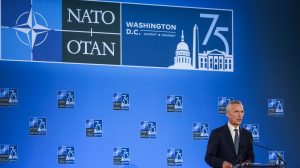Catch up quickly with the stories from Central and Eastern Europe that matter, this week led by news of timely military support for Ukraine from both Brussels and Washington.
Russia’s war on Ukraine
On Wednesday, European Union countries agreed to provide five billion euros for military aid to Ukraine as part of a revamp of an EU-run assistance fund, handing Kyiv a timely boost as its forces struggle against Russia’s invasion.
Ambassadors from the EU’s 27 member countries agreed to the overhaul of the European Peace Facility (EPF) fund at a meeting in Brussels after months of wrangling.
The fund operates as a giant cashback scheme, giving EU members refunds for sending munitions to other countries.
France, a strong promoter of European defence industries, had insisted on a strong “buy European” policy for arms eligible for refunds. Other countries argued that such a requirement would inhibit efforts to buy worldwide to get weapons to Ukraine quickly.
Germany, by far Europe’s biggest bilateral donor of military aid to Ukraine, had demanded donations be taken into account in determining the size of countries’ financial contributions to the fund.
Diplomats said compromise was eventually reached allowing flexibility on the “buy European” rules and taking into account part of the value of bilateral aid when calculating members’ financial contributions.
The previous day, the US said it will send 300 million US dollars in military weapons to Ukraine, including ammunition, rockets and anti-aircraft missiles.
The surprise announcement came as a bill in Congress to send further aid to Ukraine remans stalled amid partisan debate. The US shipment, the first in nearly three months, is intended to prevent Ukraine from losing ground to Russia.
National Security Adviser Jake Sullivan said this aid “is nowhere near enough to meet Ukraine’s battlefield needs”.
“This ammunition will keep Ukraine’s guns firing for a period, but only a short period,” Sullivan told reporters on Tuesday, adding that “it will not prevent Ukraine from running out of ammunition.”
The White House has been appealing to Congress for months to pass a budget that sends aid to Ukraine, as well as Israel and Taiwan.
A 60 billion US dollars aid bill has already passed the Senate, but has yet to face a vote in the House of Representatives.
Earlier in the week, Hungarian Prime Minister Viktor Orbán said that Donald Trump will not fund Ukraine’s fight against Russia’s invasion if he is elected US president again.
“He will not give a penny in the Ukraine-Russia war. That is why the war will end,” Orbán said after meeting Mr Trump in Florida.
The former US president has pledged to end the war “within 24 hours” if elected – but provided no details. Orbán is openly backing his long-term ally in the 2024 White House race.
The Ukrainian director Mstyslav Chernov used his acceptance speech for 20 Days in Mariupol, which won the Oscar for best documentary feature on Sunday, to give an emotional denunciation of the continued invasion of his country by Russian forces.
“I’ll be the first director on this stage who will say, ‘I wish I never made this film,’” Chernov said.
The harrowing first-person account from Chernov, a video journalist for The Associated Press, captures the first days of the Russian invasion and the devastation and destruction the port city of Mariupol faced. 20 Days in Mariupol is the first Ukrainian film to win an Oscar.
“I wish to be able to exchange this to Russia never attacking Ukraine, never occupying our cities,” Chernov continued. “I wish to give it all the recognition to Russia not killing tens of thousands of my fellow Ukrainians. I wish for them to release all the hostages, all the soldiers who are protecting their lands, all the civilians who are now in their jails.”
Other news from the region
The European Union’s executive arm will recommend that member countries open membership negotiations with Bosnia and Herzegovina, European Commission President Ursula von der Leyen said Tuesday, despite lingering ethnic divisions in the Western Balkan country. Bosnia and Herzegovina is among six nations from the region—the others are Albania, Serbia, Kosovo, Montenegro and North Macedonia—who are at different stages of the EU accession process following a period of wars and crises in the 1990s. Their memberships have been stalled for years.
A senior US official on Wednesday urged Kosovo and Serbia to make tough decisions to restart talks and “move forward” on normalising ties. Deputy Assistant Secretary of State Gabriel Escobar met with officials in Kosovo in the latest American effort to restart the talks between the two countries after Kosovo made a controversial decision to ban ethnic Serbs in its territory from using the Serbian currency, the dinar. The central bank’s ban sparked new tensions and threatened to cause chaos in minority Serbian areas, where the dinar is widely used to pay pensions and salaries.
Romanian President Klaus Iohannis said on Tuesday he has decided to run for NATO’s leadership, a position for which many member states support outgoing Dutch Prime Minister Mark Rutte. In February, the United States, Britain, France and Germany backed Rutte to succeed Jens Stoltenberg as the head of NATO, putting him in a strong position to win the leadership of the transatlantic alliance. On Tuesday, however, Iohannis said he will compete for the post, arguing Eastern European states need better representation in Euro Atlantic leadership roles.
Gabriel Resources a Canadian developer which aimed to build one of Europe’s largest gold and silver mines, lost a 4.4 billion US dollars damages claim against Romania for quashing the project more than a decade ago over environmental concerns. The World Bank’s international settlement arm dismissed Gabriel’s case and awarded Romania about 10 million US dollars in legal fees and expenses. In an arbitration claim filed in 2015, Gabriel alleged that Romania’s government had unlawfully blocked permits for the development of the project, disregarded existing license rights.
The new pro-EU Polish government this week recalled 50 of its ambassadors appointed by the former right-wing administration in an effort to improve diplomatic ties. The Polish Foreign Ministry on Wednesday said it was removing diplomats appointed by the previous government. Without naming the ambassadors, the ministry said the change was “necessary” and would serve a “better, professional implementation of the difficult tasks” facing the country’s foreign policy. The ministry did not clarify when the recalled ambassadors would be replaced.
A senior official in Moldova said on Wednesday Moscow was breaking laws by printing ballot papers in the separatist region of Transnistria ahead of this weekend’s Russian presidential election. Moldova’s authorities have already summoned the Russian ambassador to complain about a decision to open six polling stations in Transnistria. The government said the move broke an agreement to allow voting only at a single polling station at the Russian embassy in Chisinau. The ambassador rejected the complaint, telling reporters Russia was simply enabling some 250,000 Russian nationals in Moldova to vote.
Croatia’s parliament was dissolved on Thursday to pave the way for a parliamentary election later this year. All 143 of a total of 151 lawmakers who were present at the session voted in favour of the move. The date of the election is yet to be set. Prime Minister Andrej Plenković has suggested it should be held before the vote for the European Parliament, which will be held on June 6-9. The upcoming vote in Croatia will pit ruling conservative Croatian Democratic Union against a group of centrr and left-leaning parties who have announced they will run in a coalition.
Armenian Prime Minister Nikol Pashinyan welcomed on Thursday a European Parliament resolution construed by him as an endorsement of his administration’s possible decision to seek Armenia’s membership in the European Union. The resolution passed on Wednesday reaffirms support for Armenia’s territorial integrity and “democratic credentials,” praises the Armenian government for seeking closer ties with the EU and hails the effective suspension of the country’s membership in the Russian-led Collective Security Treaty Organisation (CSTO).
Photo by Yurii Khomitskyi on Unsplash.
Unlike many news and information platforms, Emerging Europe is free to read, and always will be. There is no paywall here. We are independent, not affiliated with nor representing any political party or business organisation. We want the very best for emerging Europe, nothing more, nothing less. Your support will help us continue to spread the word about this amazing region.
You can contribute here. Thank you.







Add Comment